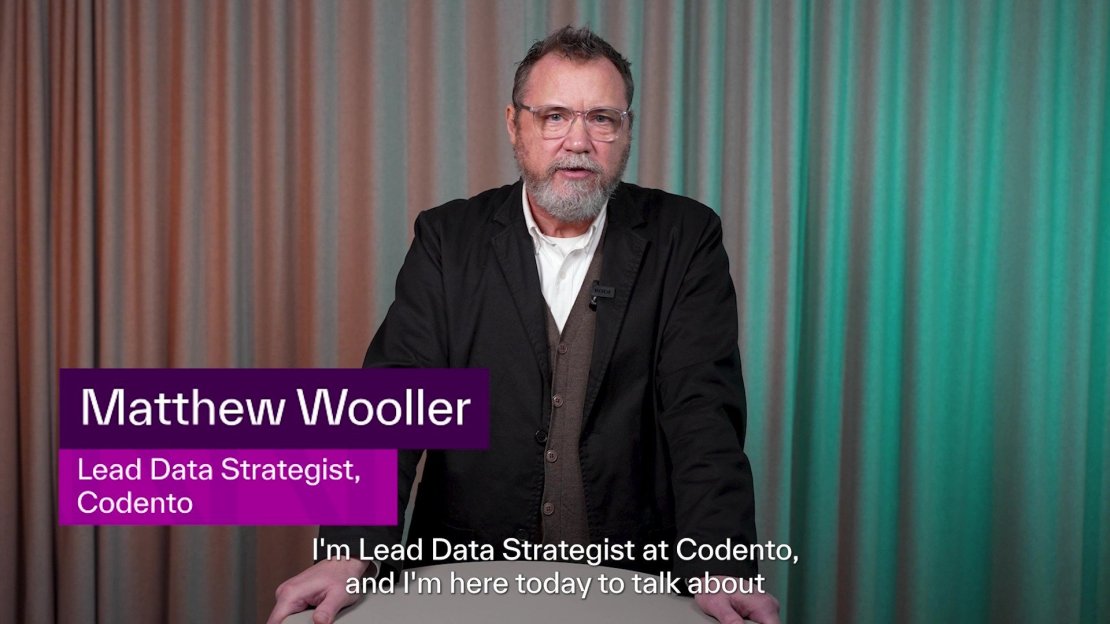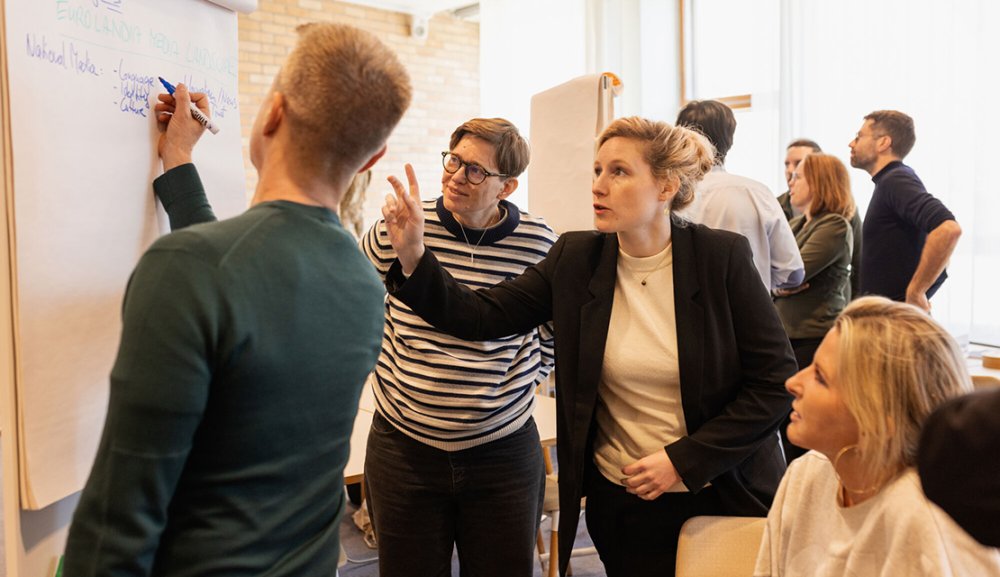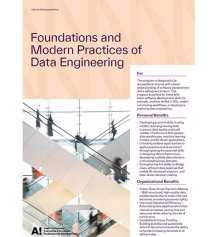Enrollment
Delivery mode
Onsite
Frequency
Location
Aalto University Töölö, Helsinki, Finland
Language
English
Scope
2 days
Foundations and Modern Practices of Data Engineering
Imagine being the person who enables companies to make better decisions by ensuring clean, accessible, and well-structured data. How valuable would that be in your current role? What if you could build automated data pipelines that not only save time but also power machine learning and AI-driven insights?
Data-driven decision-making and robust data infrastructure are now essential for companies across all industries - but there is a catch, raw data must first be extracted, cleaned, transformed, and organized before it can deliver meaningful insights. This is where data engineering plays a critical role.
The Foundations and Modern Practices of Data Engineering program provides essential knowledge and practical skills to build scalable, efficient data pipelines. For businesses, this means improved data reliability, automation of manual processes, and enhanced analytics capabilities to drive informed strategies. For professionals, it offers the opportunity to develop in-demand expertise and gain hands-on experience with modern data tools and techniques.
In data engineering, you will be managing the seamless flow of information across systems. Through practical exercises, the program will explore data storage solutions ranging from traditional databases to unstructured data lakes. More than just theoretical knowledge, this program will equip you with real-world skills, ensuring you can confidently build and manage efficient, sustainable data infrastructures.
Start
Fee: € 1,590 (+ VAT)
We offer a group discount when two or more people from your organization participate in the training:
5 or more participants: 25% discount
4 participants: 20% discount
3 participants: 15% discount
The discount is calculated directly at the checkout when the required number of seats has been added to the cart.

Watch the video and listen to the instructor's views.
Benefits
In today’s data-driven world, businesses that can efficiently collect, process, and analyze data gain a significant competitive advantage. If you want to design and build data infrastructure, develop scalable data solutions, or manage and analyze large datasets, this course will provide the essential skills you need. The possibilities for applying what you learn are endless. Investing in data engineering skills will bring tangible benefits to you and your organization:.
For
This program is designed to be accessible to anyone with a basic understanding of software development and a willingness to learn. We will start with the fundamentals and build your knowledge step by step towards mastering data engineering.
This program is perfect for those with basic software development skills, for example, analysts skilled in SQL, coders automating workflows, or developers exploring data engineering. If you have experience in these areas, you already have the essential skills to contribute to data engineering projects.
Through this program, participants will not only strengthen their technical skills but also contribute to creating efficient, data-driven systems that benefit their teams and organizations.
Contents and Schedule
The program covers core concepts of data engineering, including ETL processes, data storage solutions, and building scalable data pipelines. Participants will also gain hands-on experience with modern data tools and learn to support AI and machine learning applications.
Learning objectives
- Understanding the core concepts of data engineering
- Gaining a strong foundation in ETL (Extract, Transform, Load) processes
- Ability to design and implement ETL processes
- Getting hands-on experience with widely used data engineering tools
- Learning to design, build, and maintain robust, scalable data pipelines
- Prioritize data quality and understand data provenance
- Ability to work with various data storage solutions
- Developing the skills to support data warehouses, machine learning models, and AI-driven applications
The program will be delivered onsite.
Instructor

Matthew Wooller
Matthew Wooller is the Lead Data Strategist and Evangelist at Codento, and he keeps his hand in on the technical side of things by contributing engineering and architecture to client work where required.
Wooller has over thirty years of experience working on data-centric projects with companies such as MTV Networks Europe and Asia, the UKTV group, Sulake, Rovio, and Sanoma. In the past ten years, he has returned to consulting (it is where he started) and worked with global brands across many and varied domains to deliver data-led initiatives and instill a data-driven mindset. sentences)
Data Engineers: The Unsung Heroes of the Modern Organization
webinar with Matthew Wooller
Watch recordingProgram Fee and Registration
Program Fee
The fee for the Foundations and Modern Practices of Data Engineering program is € 1,590 (+ VAT).
We offer a group discount when two or more people from your organization participate in the training:
5 or more participants: 25% discount
4 participants: 20% discount
3 participants: 15% discount
The discount is calculated directly at the checkout when the required number of seats has been added to the cart.
See Other Programs That Might Interest You

In the program, you will seek views on digital responsibility and look at digitalization as a phenomenon from a sustainability perspective. The program is organized by Aalto EE in Singapore.
Fee: SGD 2,500 (approx. € 1,800)

Managing Technical Debt program is designed to equip organizations to understand the concept and challenges associated with technical debt, while providing them with the essential knowledge and skills to manage it effectively.
Fee: € 2,100 (+ VAT)

The AI and Data module offers you a foundational understanding of data analytics, AI, data quality, and data strategies while developing the ability to address related challenges and solutions with stakeholders. You will learn to enhance organizational practices, build data capabilities, and navigate technical and cultural barriers to data sharing effectively.
Fee: € 3,300 (+ VAT)

Schedule June 2–4, 2025
Location Aalto University Töölö, Helsinki, Finland
AI Methods and Applications module will increase your understanding of how data, analytics, and AI can enhance organizational practices, drive innovation, and support strategic decision-making. You will gain practical knowledge of advanced AI methods, including their applications, implementation, and the ability to address challenges while fostering efficiency and competitive advantage.
Fee: € 3,300 (+ VAT)

Location Aalto University Töölö, Helsinki, Finland
The program provides essential knowledge and practical skills for building scalable and efficient data pipelines and enhancing business decision-making, automation, and analytics capabilities. Participants will also learn to manage modern data infrastructure, supporting AI and machine learning applications while gaining a competitive edge and cost savings.
Fee: € 1,590 (+ VAT)

Schedule June 16–17, 2025
Location Aalto University Töölö, Helsinki, Finland or Live online
Frequency Once a year
In this program, you will examine digitalization as a global and social phenomenon from the perspective of responsibility. The program is held in Finnish.
Fee: € 2,100 (+ VAT)
September 15 – December 1, 2025

Schedule September 15 – December 1, 2025
Location Aalto University Töölö, Helsinki, Finland
This program thoroughly examines what leaders and decision-makers should know about AI technology and its implications for business. It covers the technologies’ possibilities and limitations, through leading organizational transformations to ecosystem-level changes.
Fee: € 6,700 (+ VAT)
September 15–16, 2025

Schedule September 15–16, 2025
Location Aalto University Töölö, Helsinki, Finland
This program provides you with an in-depth understanding of the ongoing changes in strategy and management practices brought by contemporary digital technologies. The program will increase your understanding of the technical changes, economic logic, and new business models driving the ongoing digital transformation. After the program, you will be able to identity, foresight, and respond to changes taking place in an industry, including the shift toward digital ecosystems.
Fee: € 3,100 (+ VAT)
September 17, 2025

The program provides a comprehensive introduction to the core concepts of Artificial Intelligence (AI), Machine Learning (ML), data, and analytics. Participants will explore the key methods used in AI today and examine practical examples of how these technologies are applied across industries.
Fee: € 1,300 (+ VAT)
September 23, 2025 – February 25, 2026

Schedule September 23, 2025 – February 25, 2026
Location Aalto-yliopisto Töölö, Helsinki
Frequency Once a year (start in Fall)
The focus of the training program is to develop business-oriented data management work and the use of digitalization to develop a company's business activities. You will explore business and IT strategy coordination, ICT management, portfolio management, and customer-oriented service production.
Fee: € 9,350 (+VAT)
September 29 – October 1, 2025

Schedule September 29 – October 1, 2025
Location Aalto University Töölö, Helsinki, Finland
Real-World Impact of AI Applications module explores the interaction of AI systems with society, focusing on sustainability, security, and data privacy. You will gain insights into addressing challenges in AI development, including ethical concerns, data protection, and continuous improvement, while leveraging opportunities with open data and open-source solutions.
Fee: € 3,300 (+ VAT)
October 10, 2025 – April 13, 2026

Schedule October 10, 2025 – April 13, 2026
Location Aalto University Espoo, Finland or live online
This program is a recruitment training program for unemployed job seekers. The program equips you with a solid foundation in modern data engineering, covering everything from building data pipelines and working with tools like SQL and Python to developing scalable AI workflows.
Fee: Free of charge for the participant
October 28–29, 2025

Schedule October 28–29, 2025
Location Aalto University Dipoli, Espoo, Finland
This program is aimed at professionals involved in visual content production. It provides a comprehensive introduction to the key themes surrounding the use of Generative AI in creative industries. Participants will learn core technologies behind Generative AI, how these systems function, and the implications they have for visual content creation.
Fee: 1,590 € (+ VAT)
November 18–20, 2025

Schedule November 18–20, 2025
Location Aalto University Töölö, Helsinki, Finland
This program touches on digital transformation, especially from the perspective of technology and data. During the program focus on how digitalization, platform economy, digital technology strategies, and innovative business models are transforming and providing new opportunities for business. We will also investigate data strategy and how to build a competent data team.
Fee: € 4,650 (+ VAT)
November 24–26, 2025

Schedule November 24–26, 2025
Location Aalto University, Espoo, Finland
The program provides a comprehensive and strategic perspective of modern analytics and its uses. The program combines strategy and theory with examples of practical analysis.
Fee: € 3,850 (+ VAT)
November 24–26, 2025

Schedule November 24–26, 2025
Location Aalto University Töölö, Helsinki
The Cyber Security for Executives program delivers a strategic understanding of cybersecurity risk management, empowering you to strengthen your company’s security posture. This program helps you identify cybersecurity’s true business value—not just as a compliance requirement, but as a core pillar of a responsible company.
Fee: € 4,650 (+ VAT)
November 24–26, 2025

Schedule November 24–26, 2025
Location Aalto University Töölö, Helsinki, Finland
Future Considerations of AI module delves into cutting-edge topics based on the most current and relevant themes and phenomena, such as AI agents, explainable AI, quantum machine learning, and edge AI, emphasizing their applications, challenges, and transformative potential. You will gain a deep understanding of integrating technologies such as IoT and quantum computing while prioritizing transparency, safety, and industry innovation.
Fee: € 3,300 (+ VAT)
December 1, 2025

Schedule December 1, 2025
Location Aalto University Töölö, Helsinki, Finland
Leading the AI Transformation Process is a one-day module in the AI for Leaders and Decision-Makers program and can also be taken as a stand-alone program.
Fee: € 1,890 (+ VAT)

We will bring together CDOs and data leaders from industries, government, and academia to join us for thought-provoking conversations and collaboration in Finland. The purpose is to advance knowledge in data leadership and create a better understanding of how organizations can ensure quality in the data, algorithms, and programs they manage which in turn will help Chief Data Officers create impactful value for business through trustworthy data.
Fee: € 950 (+ VAT) / € 250 (+ VAT)

Schedule March 3–4, 2026
Location Aalto University Töölö, Helsinki, Finland
This program addresses leadership and organizational perspective of digitalization, including how to use data-based insights in leading people, how to collaborate in digital ecosystems across organizational boundaries, and how to lead people in digital transformation.
Fee: € 3,100 (+ VAT)

Schedule May 25–26, 2026
Location Aalto University Töölö, Helsinki, Finland
This program provides you with an in-depth understanding of the ongoing changes in strategy and management practices brought by contemporary digital technologies. The program will increase your understanding of the technical changes, economic logic, and new business models driving the ongoing digital transformation. After the program, you will be able to identity, foresight, and respond to changes taking place in an industry, including the shift toward digital ecosystems.
Fee: € 3,100 (+ VAT)

Schedule Estimated Study Time: 12 hours
Location E-learning environment
This online course assists the user in understanding the fundamentals of data and analytics and how to use this tool in decision-making. Course language: English
Fee: € 350 (+VAT)

Schedule Flexible start, can be completed in 6–9 months
Location Aalto University Töölö, Helsinki, Finland
The program prepares you to disrupt the digital technology wave and leverage its full potential for real business benefits. It covers the latest trends in technology and provides you with practical tools and methods for the agile implementation of new skills and knowledge. It will help you to challenge your strategic thinking and gain a comprehensive overview of how organizational structures, practices, and culture will support the implementation of a renewed strategy as well as recognize the knowledge and skills needed for maintaining and gaining competitive advantage now and in the future.
Fee: € 12,700 (+ VAT)

Schedule Lessons running time approx. 100 minutes.
Location E-learning environment
The course gives you a concise understanding of information visualization, why it is needed, and how to get started. It helps you to initiate your visualization and prompts you to pursue your task with adept advice. Course language: English
Fee: € 350 (+VAT)

Location Aalto University Töölö, Helsinki
Generative AI is a major technological revolution that promises to supercharge productivity. This coming change has been most vividly illustrated by ChatGPT, the OpenAI’s chatbot service that can respond to prompts as well as proofread, summarize, and expand on a given text.

Schedule Estimated study time: 81 hours
Location E-learning environment
This course provides a multi-disciplinary and holistic overview of information security management. It is designed based on scientific and practical evidence, and the topic areas is approached from technical, social, organizational, and ethical perspectives.
Fee: TBA

Schedule Study time: 2 hours
Location E-learning environment
This dynamic two-hour Aalto EE Master Class will broaden your understanding of cognitive automation, its impact on your organization, and far-reaching implications for knowledge work.
Fee: € 50 (+ VAT)

Schedule Study time: 2 hours
Location E-learning environment
This is a recording of a two-hour deep dive into the world of digital twins, the ongoing revolution in asset-centric information management. In this masterclass, you will gain a comprehensive understanding of what digital twins are, where they are going, and why they are essential for your organization.
Fee: € 50 (+ VAT)

This course offers you a clear and science-based look into how AI works and how it is used in various contexts, focusing on the principles behind it and its practical uses. You will gain a solid understanding of the core concepts of AI to comprehend its mechanisms and potential. Course language: English
Fee: € 350 (+VAT)

Schedule Estimated study time: 27 hours
Location E-learning environment
A Human-Centered Approach in AI Deployment online course explores the human-centered approach in the deployment of AI, focusing on its transformative potential and the critical role of individuals and organizations in managing its impact. The course aims to equip participants with the knowledge and skills to implement AI in ways that are ethical, effective, and centered around people.
Fee: € 150 (+VAT)


















